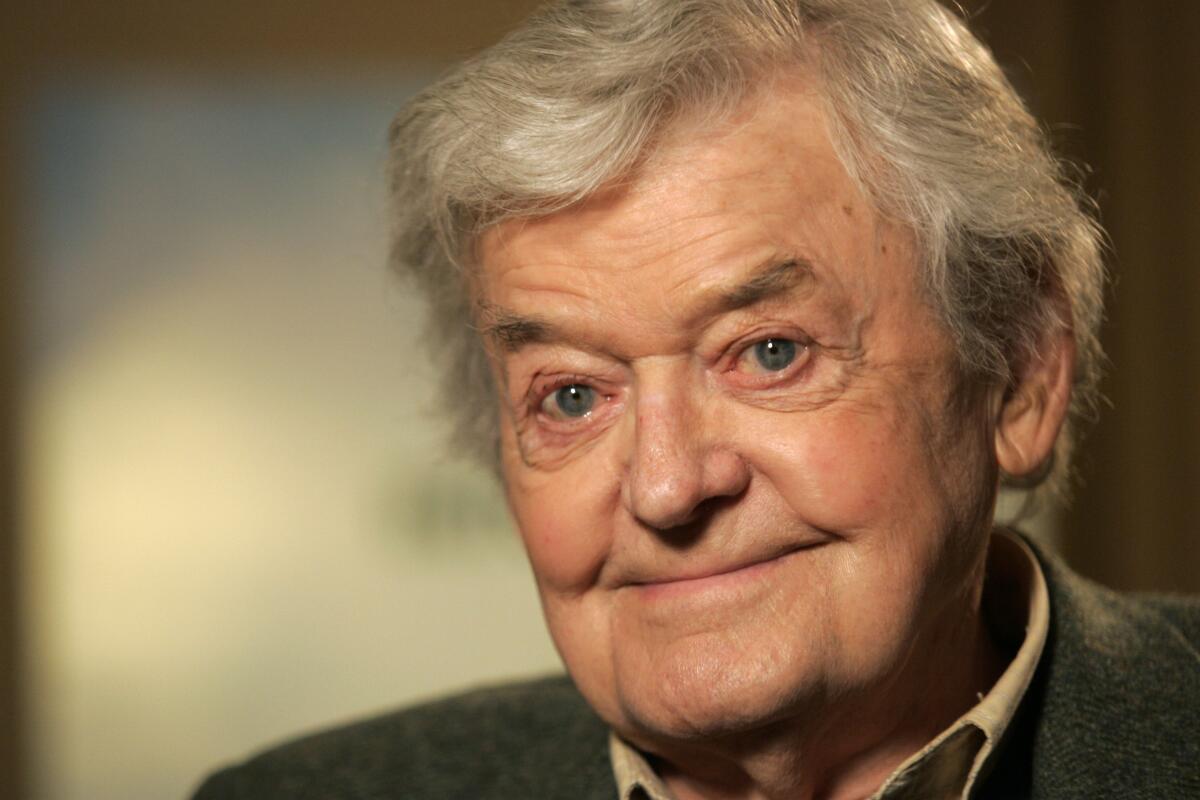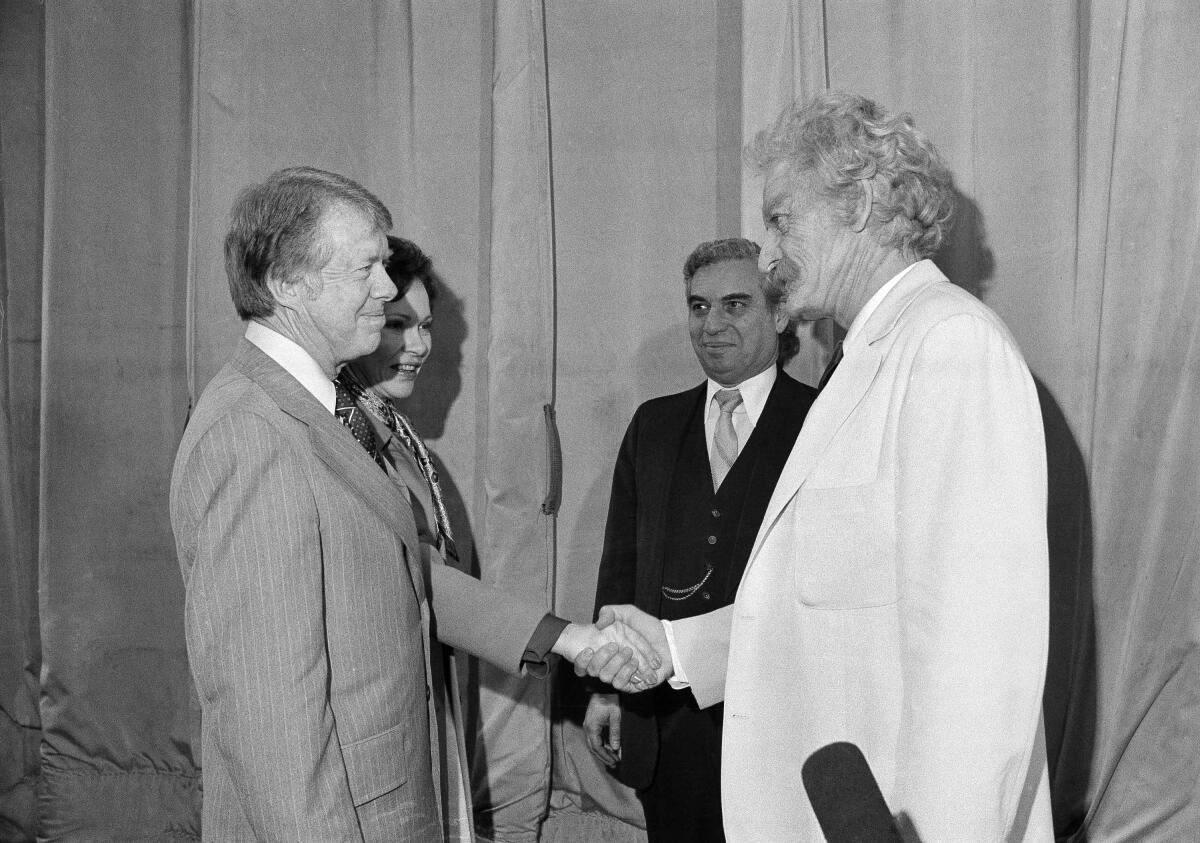Hal Holbrook, actor known for amazingly accurate portrayal of Mark Twain, dies at 95

- Share via
Hal Holbrook, the actor best known for his amazingly accurate portrayal of Mark Twain in the renowned one-man show he performed on stages for more than five decades, has died. He was 95.
Holbrook died Jan. 23 in Beverly Hills, his representative, Steve Rohr, told The Times. No cause of death was provided.
For the record:
1:53 p.m. Feb. 3, 2021A previous version of this obituary said that Holbrook attended Culver Military Academy in Culver, Ohio. The academy is in Culver, Ind.
Holbrook’s Tony Award-winning Twain re-creation on Broadway in 1966 was part of an acting career that spanned stage, movies and television. He first encountered Twain when he portrayed the legendary author and humorist in a two-person sketch that was part of a multi-character revue Holbrook and his first wife took on a high school assembly tour of the Southwest in the late 1940s.
By the time Holbrook turned Twain into a one-man show in 1954, he had performed the brief Twain sketch, “An Encounter With an Interviewer,” some 800 times in front of high school, university and women’s club audiences.
After developing and performing his one-man Twain show in New York nightclubs and in regional performances — as well as performing pieces of his act on “The Ed Sullivan Show” and other TV programs — Holbrook opened “Mark Twain Tonight!” off-Broadway in 1959.
Reviewers were uniformly ecstatic in their praise, calling Holbrook’s Twain re-creation “brilliant” and the show “extraordinary.” Life magazine called it “the greatest theatrical surprise of the year.”
Holbrook went on to tour the United States, Canada and Europe with his one-man show before bringing “Mark Twain Tonight!” to Broadway in 1966 to rave reviews.

The 41-year-old actor’s Broadway triumph was the culmination of more than a decade of research into the life, literature and idiosyncrasies of one of America’s best-known literary icons.
Holbrook had honed Twain’s speech: his drawl, his slow, casual delivery on the lecture platform and his way of dropping comic nuggets with what Holbrook called “the innocent air of a man who does not realize he has said anything funny.”
He had perfected the look: the shock of white hair and drooping mustache, along with the age lines, nose and jowls — make-up that took more than three hours to apply.
He also had refined the costume: a white, three-piece linen suit and black shoes, a maroon cravat with a diamond stickpin, a vintage gold pocket watch with a heavy gold chain, and a small silver penknife that Holbrook used to cut off the ends of the three cigars he smoked during each performance.
Most important, Holbrook had made Twain’s words, taken directly from the author’s lectures and other writings, his own.
As he ambled on stage, the transformation of Hal Holbrook into Mark Twain was complete.
“Ladies and gentlemen,” he would begin, “I wish to present to you a man whose great learning and veneration for truth are only exceeded by his high moral character and majestic presence. I refer in these vague, general terms to myself.”
A New York Times critic praised “the theatrical magic of Hal Holbrook. He brought Mark Twain back to life to stir the laughter and stab the conscience of a public yearning for such a voice as that of the nation’s one true comic genius.”
In 1967, a national audience of 30 million watched Holbrook’s Emmy-nominated performance in a televised version of “Mark Twain Tonight!” on CBS.
Not wanting to be trapped in the legendary character that made him famous, Holbrook made a point of shaping a varied career as an actor, which included one of his most famous film roles: the mysterious Deep Throat in the 1976 film “All the President’s Men.”
On stage, he played everything from Shakespeare’s King Lear to Shylock to Willy Loman.
On television, he won Emmy Awards for his 1970-71 dramatic series, “The Senator,” the 1973 TV movie “Pueblo” (for which he won Emmys for actor of the year — special, and best lead actor in a drama) and the 1974 miniseries “Sandburg’s Lincoln.”
He also earned an Emmy nomination for his role in “That Certain Summer,” a landmark 1972 TV movie about a divorced homosexual father; he had a recurring role as Julia Sugarbaker’s love interest on the sitcom “Designing Women,” which starred his third wife, Dixie Carter, as Sugarbaker; and he played Burt Reynolds’ cantankerous father-in-law on “Evening Shade.”
Among his film credits are “The Group,” “Magnum Force,” “Julia,” “Wall Street,” “The Firm” and “The Majestic.”
In 2008, at age 82, Holbrook was nominated for an Academy Award, earning a best supporting actor nomination for the role of a lonely widower in “Into the Wild.”
But Holbrook could never shake his image as Mark Twain reincarnated. Nor did he want to stop doing something that was so enduringly successful and “so much fun to do.”
Holbrook was 29 when he began playing the 70ish Twain in his one-man show, and he stuck with Twain for so many years he eventually became older than the age of the historic character he was playing.
To keep fresh, he added new Twain material to the act and, depending on his mood, he often would shift material while on stage.
“I’ve just become more and more impressed with him,” Holbrook told the Boston Globe in 1997. “The same truths that captured me when I started in 1954 are even more apparent today.”
Playing Twain, he said, is “a genuine pleasure, and it’s a way of getting things off my chest. It’s a catharsis. Let’s face it, one of Twain’s favorite subjects was hypocrisy, and that happens on different levels all the time. It’s never out of fashion.”
As of 2009, he continued to portray Twain on stages 20 to 30 times a year.
Born Harold Rowe Holbrook Jr. in Cleveland, Ohio, on Feb. 17, 1925, he was the middle child between sisters. (A brother died in infancy.) When he was 2, his mother abandoned the family and, Holbrook later learned, moved to New York City, where she worked as a chorus girl.
Holbrook’s father, a shoe salesman, disappeared a few days after their mother, and Holbrook and his sisters were sent to live with their paternal grandparents in South Weymouth, Mass.
At 7, Holbrook was sent to Suffield Academy in Suffield, Conn., where, he later said, he and the other students were routinely beaten by the sadistic headmaster. Holbrook developed an interest in theater at Culver Military Academy in Culver, Ind., where he graduated in 1942.
Drawn by the drama department at Denison University in Granville, Ohio, Holbrook studied there for a year before being called up for military service in 1943.
While serving with the Army Corps of Engineers in Newfoundland, he joined an amateur theater group, where he met actress Ruby Johnston. They were married in 1945. After his discharge, Holbrook returned to Denison University, where both he and his wife majored in drama.
In 1947, during the fall of their senior year, Holbrook received a late-night phone call that would alter the course of his life.
The call was from Edward Wright, head of the university’s theater department, who said he had been asked by a school assembly booker from Dallas if he had any students who could tour high schools in the Southwest with a show for 30 weeks the next season.
As Holbrook recounted in the prologue of his 1959 book “Mark Twain Tonight! An Actor’s Portrait,” Wright told the booker he had a young married couple at the university who had a two-person show in which they performed scenes from the lives of famous personalities: Robert and Elizabeth Barrett Browning, John Alden and Priscilla, Queen Victoria and Prince Albert, Mark Twain and a few Shakespearean characters as well.
Wright told Holbrook the job paid $210 for 12 shows a week, plus $15 for gas and oil. Holbrook told Wright they’d do it, although he and his wife really didn’t have such a show.
Before the Holbrooks began putting their show together, Wright gave them a copy of Twain’s “An Encounter With an Interviewer,” a humorous piece in which Twain pulls the leg of a reporter with no sense of humor.
Holbrook recalled that he and his wife began doing the “Interviewer” sketch for clubs and school groups, and then began adding scenes from Shakespeare’s “As You Like It” and other selections.
With a $3,000 loan from the president of a bank in Newark, Ohio, who had seen the Holbrooks in college productions, the couple bought material for costumes, stage lights, an amplifying system for musical bridges and a station wagon to transport both them and their cargo.
In September 1948, they set out on their school assembly tour of the Southwest.
Their audiences improved dramatically over the next three years, Holbrook recalled. They performed their show at women’s clubs and small colleges about nine months out of the year and acted in summer stock for part of the summer.
In 1954, after moving to New York City, Holbrook landed a continuing role as the reformed alcoholic son of a minister on the TV soap opera “The Brighter Day.” The job lasted more than five years, during which he developed and performed his solo Twain show.
In 2001, while working on his autobiography, Holbrook discovered why he became an actor.
“I realized there was an imp in me that wanted to say, ‘Here I am. Here I am,’“ he told the Hartford Courant. The little boy who had been abandoned by his parents, he said, “was frightened, but he wanted to be noticed.”
The twice-divorced Holbrook, who married Carter in 1984, had two children, Victoria and David, with his first wife; and a daughter, Eve, with his second wife, Carol Rossen.
Carter died of complications from cancer in 2010. Less than four weeks later, Holbrook returned to the stage, performing “Mark Twain Tonight!” at the Thousand Oaks Civic Arts Plaza.
“Look,” he told The Times shortly thereafter, “I need to work. If I don’t work, I could sit down and contemplate suicide. My wife was no quitter … she would be telling me to get out there to do my work, and that’s what I’m doing. So that’s the main thing — to keep working, to keep trying to figure out how to do this job right.”
More to Read
Start your day right
Sign up for Essential California for the L.A. Times biggest news, features and recommendations in your inbox six days a week.
You may occasionally receive promotional content from the Los Angeles Times.






